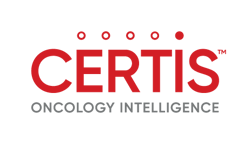LET’S Close the Translation Gap in Oncology together
This past AACR conference brought together nearly 21,000 cancer researchers from around the world to advance the frontiers of cancer science and medicine. Certis can help you advance your therapeutic pipeline with reproducible and scalable cancer models and data. Schedule a time to discuss your preclinical program goals with us.
Quickly Access Certis Poster Presentations
From the AACR Annual Meeting 2023
"Gene Expression-Based Machine Learning Classifier to Predict and Validate Cancer Type in PDX Models"
Abstract: Patient-Derived Xenograft (PDX) models are increasingly utilized in translational research and drug development. Characterizing the genomic features of PDX is essential to establishing reliable models for cancer research. Despite great interest, problems remain in PDX tumor data banks, including improper cancer-type diagnosis and sample mix-ups. To improve annotation and quality of PDX models, Certis developed a machine-learning model trained on gene expression data from the Cancer Genome Atlas (TCGA). Certis then applied the model to corresponding data collected from nearly 300 Certis PDX models as well as the National Cancer Institute’s (NCI) Patient-Derived Models Repository (PDMR). The model shows high precision and variable recall and provides a fast and accurate method for cancer-type diagnosis.
Authors: Warren Andrews, PhD1; Long Do, PhD1; Jonathan Nakashima, PhD1
1Certis Oncology Solutions, San Diego, CA
"In Vivo Tumor Implantation Site Exhibits Differential Immune Response in Solid Tumors"
Abstract: Successful discovery and development of cancer therapeutics depends on testing agents in the most clinically relevant translational models. Emerging evidence highlights the importance of the local tumor microenvironment in evaluating the efficacy of new therapeutics, especially for immunotherapies. Historically, patient-derived xenograft (PDX) modeling involves subcutaneous implantation which minimally represents the actual human tumor site. Here, Certis uses peripheral blood mononuclear cell (PBMC) humanized PDX models to demonstrate differences in the tumor microenvironment, overall immune response, and the pharmacological outcome, between subcutaneous and orthotopic PDX models. These findings highlight the importance of testing new therapies in the most clinically relevant setting for greater translation into clinical success.
Authors: Rajeev Shrimali, PhD1; Jasmine Borroel1; Carmen Sunico, PhD1; Bridget Corcoran1; Bianca Carapia1; Rowan Prendergast1; Jantzen Sperry, PhD1; Jonathan Nakashima, PhD1
1Certis Oncology Solutions, San Diego, CA
"Monitoring Drug Response with Circulating Tumor DNA in a Non-Small Cell Lung Cancer (NSCLC) Patient-Derived Xenograft Model"
Abstract: Circulating tumor DNA (ctDNA) has been shown as a clinically relevant biomarker for non-invasive monitoring of therapy response, disease burden and disease progression in cancer patients. Patient-derived xenograft (PDX) mice are essential preclinical models to evaluate therapeutic response. Patients with a KRAS G12 mutation in Non-Small Cell Lung Cancer (NSCLC) have been shown to be resistant to EGFR inhibitors. Here, Certis reports Whole Genome Sequencing (WGS) of ctDNA from PDX for the monitoring of therapeutic response and demonstrates measurable ctDNA changes concordant with therapeutic response. Altogether, the isolation of ctDNA from PDX models is a robust methodology for interrogating therapeutic efficacy, response and resistance in a preclinical setting that can be translated as a viable biomarker for non-invasive monitoring in patients.
Authors: Raffaella Pippa, PhD1; Warren Andrews, PhD1; Yuan-Hung Chien, PhD1; Jantzen Sperry, PhD1; Jonathan Nakashima, PhD1
1Certis Oncology Solutions, San Diego, CA
Studying Rare or Complex Cancers?
About Us
Certis Oncology Solutions is a life science technology company committed to accelerating the development of new cancer therapies. Our product is Oncology Intelligence™ — highly predictive therapeutic response data derived from advanced biological models of cancer and enhanced with AI-driven bioinformatics. Certis partners with therapeutics developers to help close the problematic translation gap between preclinical studies and clinical trials.
Through more clinically relevant, well-characterized and annotated cancer models, advanced imaging technology, including x-ray irradiation with image-guided radiation therapy, and thoughtfully designed custom studies, our proprietary platform brings greater certainty to go/no-go drug development decisions.

![CancerTypeClassifierHeatmap[83]-1 CancerTypeClassifierHeatmap[83]-1](https://info.certisoncology.com/hs-fs/hubfs/CancerTypeClassifierHeatmap%5B83%5D-1.png?width=1360&height=1044&name=CancerTypeClassifierHeatmap%5B83%5D-1.png)




